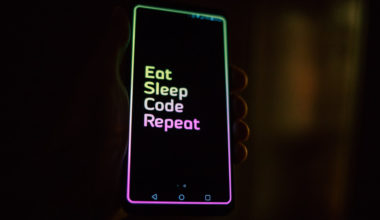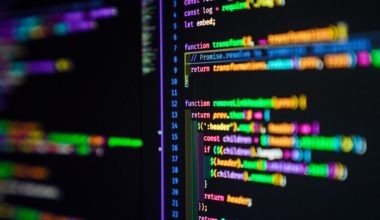Writing clean and efficient code is a key skill for any developer.. In this article, Here are best practices and tips for writing code that's easy to understand, maintain and perform well.
Uses variable names and descriptive functions
Using variable names and descriptive functions is one of the best programming practices that every programmer should follow. Names should be clear and concise, and must reflect the purpose of the variable or function. In this way, anyone else reading the code can easily understand what's going on in the program..
To follow this practice, it is advisable to use meaningful names instead of short or abbreviated names. In addition, Variable and function names must follow a consistent naming convention throughout the code.
An example of a descriptive variable name would be “edad_usuario” Instead of “Eu”. While an example of a descriptive function name would be “calcular_promedio” Instead of “Cp”. Using variable names and descriptive functions, Code becomes more readable and easier to maintain, which increases your efficiency.
Write code that's easy to read and understand
It's important that the code you write is easy to read and understand for both you and other developers who may be working on the same project in the future.. Next, Here are some good practices you can follow to achieve this goal:
- Use consistent indentation: It's important that you keep the same indentation throughout your code so it's easy to read. Usually, It is recommended to use 4 spaces by indentation level.
- Use comments to explain your code: Be sure to include helpful feedback in your code so other developers can understand what you're doing.. However, Don't fill your code with unnecessary comments.
- Use friendly names for your variables: It's important that your variable names are descriptive and concise so it's easy to understand what you're doing..
- Divide your code into logical blocks: Break your code into smaller logic blocks to make it easier to read. This will also make error detection easier..
- Maintain a consistent style convention: Maintain a consistent style convention throughout your code, as this will help make it easier to read and understand..
Following these best practices, You can make your code easier to read and understand for yourself and other developers who may be working on the same project in the future..
Keep your features short and simple
To write clean and efficient code, It's important to keep your functions short and simple. Functions must have a single responsibility and do one thing well. If a function becomes too large and complex, can be difficult to read and understand, which makes it more error-prone and harder to maintain.
A good practice is to limit the number of lines in a function, ideally less than 20 lines. If a function becomes too long, consider breaking it down into smaller, descriptive functions that perform specific tasks.
In addition, It is important to keep the nesting level low. If you have multiple nesting layers in a feature, can be difficult to understand and follow the flow of logic. Instead., Try to structure your code flat and avoid deep nesting.
Last, Make sure features have descriptive and accurate names. A good function name should clearly indicate what the function does and how it is used.. Variable and function names should be clear and concise, and they shouldn't be confusing abbreviations or ambiguous terms. With descriptive names, It can improve the readability of the code and make it easier to understand and maintain.
Avoid code duplication
Code duplication, Also known as boilerplate code, It is one of the most common mistakes in programming. When copying and pasting repetitive code in multiple places, not only increases file size, it also makes code maintenance more difficult..
To avoid code duplication, It's important to identify similarities between different sections of your code and reuse them instead of copying and pasting.. Instead of creating a similar function in different parts of your code, Create a single, reusable function that can be called from anywhere.
In addition, Using libraries and frameworks can help reduce code duplication. Instead of writing all the code from scratch, You can use a library or framework that has already been developed and tested, which can save you time and reduce the amount of code you need to write.
In short, Avoid code duplication whenever possible. Reuse code instead of copying and pasting, Uses libraries and frameworks, and keep your code as concise as possible for easy maintenance and understanding.
Test and debug your code frequently
Programming is an iterative process, which means that the code must be written, Constantly tested and improved. The testing phase is crucial to ensure that the code works correctly before it is deployed to the system in production.
To test your code, It is important to create test cases that cover all possible situations in which the code can be used.. Unit testing is an effective way to make sure that every function in your code works as expected.. Integration testing is also important to make sure all parts of the code work properly together..
In addition, it is important to debug your code frequently to find and fix errors. Errors can arise in many ways, such as incorrect syntax or erroneous logic. debugging tools can be helpful in identifying and correcting these errors.
Another useful practice is to use version control to keep track of modifications made to your code.. This allows you to roll back to previous versions if something goes wrong and also helps you collaborate with other programmers effectively..
Testing and debugging code frequently is essential to ensure that code works correctly before deployment and to avoid problems in the system in production. Use testing and debugging tools, and version control are effective practices to achieve this.
Use comments and documentation
Documentation and feedback are an important part of the clean and efficient code writing process. It's critical that other developers can easily understand what the code does., how it is used and why it has been done in a certain way.
Comments are used to explain the code and the decisions behind it, while the documentation provides a broader description of the functionality and structure of the program. Both must be clear, concise and frequently updated to make sure they are useful and accurate.
When writing comments, It's important to avoid falling into the trap of explaining what the code does rather than why it does it.. Feedback should be useful to developers who need to work with code in the future, not just to explain what is already written. In addition, Comments should be short and written in clear and concise language for ease of reading.
On the other hand, Documentation should be complete and explain the structure and functionality of the entire program, from individual functions to complete architecture design. This can include diagrams and examples., and it should be detailed enough that anyone reading it can understand the program.
Documentation and commentary are an essential part of any well-written program. Provide a clear understanding of the functionality and structure of the code, which makes it easier to maintain and upgrade in the future.
Keep your code up to date and organized
Keeping your code up-to-date and organized is another programming best practice that helps you write clean and efficient code.. As a project grows, Code can become more unwieldy if it's not kept organized and up-to-date. Some ways to keep your code organized include:
- Divide the code into separate modules or files for each function or task.
- Use a version control system like Git to keep a history of code changes and revert to previous versions if necessary.
- Use build automation tools like Maven or Gradle to compile and package code in an easy-to-distribute format.
- Maintain a consistent, easy-to-follow directory structure for project files.
- Eliminates unnecessary code and unused functions.
It is also important to keep the code updated with the latest versions of the frameworks., Libraries and dependencies used in the project. keeping code up-to-date can help resolve security issues and improve project performance.
Conclusion
Programming is a constantly evolving field, And it's important for developers to stay up-to-date with best practices and techniques for writing clean, efficient code.. By following these practices, You can make your code easier to understand, Maintain and improve in the future. When using variable names and descriptive functions, Write code that is easy to read and understand, Keep your functions short and simple, Avoid code duplication, Test and debug your code frequently, Use comments and documentation, and keep your code up to date and organized, You will be able to significantly improve the quality of your code and make it more effective for you and other developers working on the project in the future.. Ultimately,, This can save time and reduce errors, which can lead to faster and more efficient development of high-quality applications and software.






